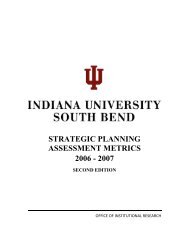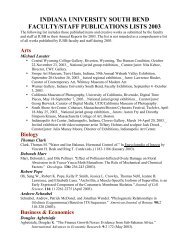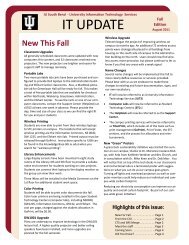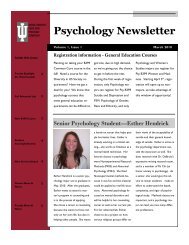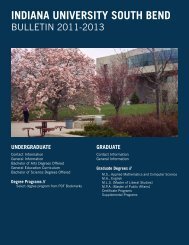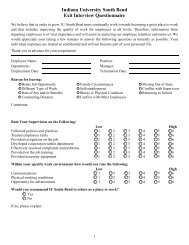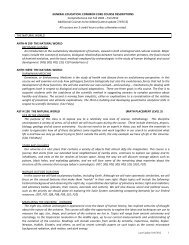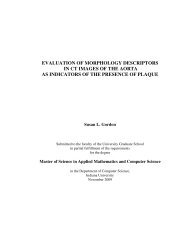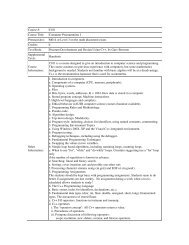Current version - Indiana University South Bend
Current version - Indiana University South Bend
Current version - Indiana University South Bend
Create successful ePaper yourself
Turn your PDF publications into a flip-book with our unique Google optimized e-Paper software.
IU SOUTH BEND COURSE DESCRIPTIONS 4297<br />
CSCI-B 424<br />
CSCI-B 438<br />
CSCI-B 451<br />
PARAllel and distributed programming<br />
(3 cr.)<br />
P: CSCI-C 243. P or C: MATH-M 301.<br />
Overview of parallel computers, shared<br />
memory, message passing, MIMD and<br />
SIMD classifications. Understanding<br />
and use of message passing and<br />
synchronization facilities such as MPI.<br />
Study of parallel programming models<br />
such as master-slave, client-server,<br />
task-farming, divide-and-conquer,<br />
and pipelining. Performance analysis<br />
of parallel systems, execution time,<br />
time complexity, load balancing, and<br />
scalability. Credit not given for both<br />
CSCI-B 424 and CSCI-B 524.<br />
fundamentals of COMPUTER<br />
NETWORKS (3-4 cr.)<br />
P: CSCI-C 243, CSCI-C 335. Fundamental<br />
concepts and technologies used in design<br />
of computer networks. Architecture<br />
and design philosophy of Internet and<br />
basic performance issues. Low-level<br />
technologies like Ethernet and wireless.<br />
Packet switching and virtual circuits. Core<br />
protocols of the Internet, such as TCP and<br />
IP. Error control, congestion control, and<br />
routing.<br />
security in COMPUTing (3 cr.)<br />
P: CSCI-C 335. An introduction<br />
to computing security to include<br />
confidentiality, integrity and availability<br />
triad, cryptography, software security,<br />
operating system security, trusted<br />
operating system design and evaluation,<br />
authentication, network threats and<br />
defenses, security management, legal<br />
aspects of security, privacy and ethics.<br />
CSCI-B 503 ALGORITHMS DESIGN AND ANALYSIS (3 cr.)<br />
P: CSCI-C 243 and MATH-M 260 or<br />
MATH-M 365 or MATH-M 463. Models,<br />
algorithms, recurrences, summations,<br />
growth rates. Probabilistic tools,<br />
upper and lower bounds, worst-case<br />
and average-case analysis, amortized<br />
analysis, dynamization. Comparisonbased<br />
algorithms: search, selection,<br />
sorting, hashing. Information extraction<br />
algorithms (graphs, databases). Graph<br />
algorithms: spanning trees, shortest<br />
paths, connectivity, depth-first, breadthfirst<br />
search. Credit not given for both<br />
CSCI-C503 and C455. II<br />
CSCI-B 524<br />
parallelism in Programming<br />
languages and systems (3 cr.)<br />
P: CSCI-C 243, MATH-M 301. Overview<br />
of parallel computers, shared memory,<br />
message passing, MIMD and SIMD<br />
CSCI-B 538<br />
CSCI-B 541<br />
CSCI-B 551<br />
CSCI-B 553<br />
classifications. Understanding and use<br />
of message passing and synchronization<br />
facilities such as MPI. Study of parallel<br />
programming models such as masterslave,<br />
client-server, task-farming,<br />
divide-and-conquer, and pipelining.<br />
Performance analysis of parallel systems,<br />
execution time, time complexity, load<br />
balancing, and scalability. Credit not<br />
given for both CSCI-B 524 and B424.<br />
networks and distributed computing<br />
(3 cr.)<br />
P: CSCI-B 438. R: CSCI-C 435. Advanced<br />
concepts and technologies of computer<br />
networks. Protocols and protocol stacks.<br />
Client-server models. Distributed object<br />
technology. High-performance and<br />
high-bandwidth techniques. Distributed<br />
operating systems. I<br />
hardware system design i (3 cr.)<br />
P: CSCI-C 243, CSCI-C 335, PHYS-P<br />
303. Structured approach to hardware<br />
design, emphasizing hardwired and<br />
microprogrammed control. Boolean<br />
algebra, hardware building blocks,<br />
architecture and control, implementation<br />
issues. In the laboratory, students build<br />
a working computer using hardware<br />
prototyping technologies. Basic training<br />
in the use of design and simulation<br />
software. Lecture and laboratory. Credit<br />
not given for both CSCI-B 541 and CSCI-C<br />
421.<br />
elementary artificial intelligence<br />
(3 cr.)<br />
P: CSCI-C 251. Major issues and<br />
approaches in artificial intelligence.<br />
Principles of reactive, goal-based, and<br />
utility-based agents. Problem solving and<br />
search. Knowledge representation and<br />
design of representational vocabularies.<br />
Inference and theorem proving, reasoning<br />
under uncertainty, and planning.<br />
Overview of machine learning. Credit not<br />
given for both CSCI-B 551 and C463.<br />
neural and genetic approaches to<br />
artificial intelligence (3 cr.)<br />
P: Permission of instructor. Biologicallyinspired<br />
approaches to the design of<br />
intelligent systems. Distributed and<br />
perceptually-grounded representations.<br />
Temporal processing. Neural-network<br />
approaches to vision and natural language<br />
processing. Evolutionary computation.<br />
Additional topics may include an<br />
introduction to analogy computing,<br />
dynamical systems, and artificial life.



